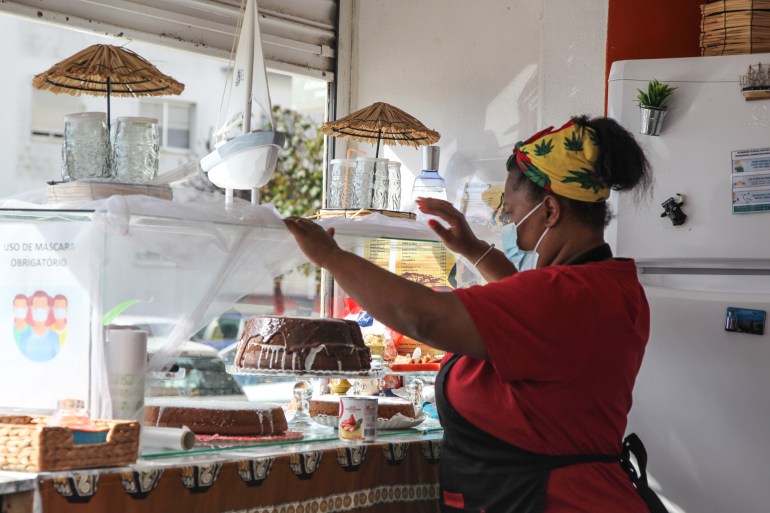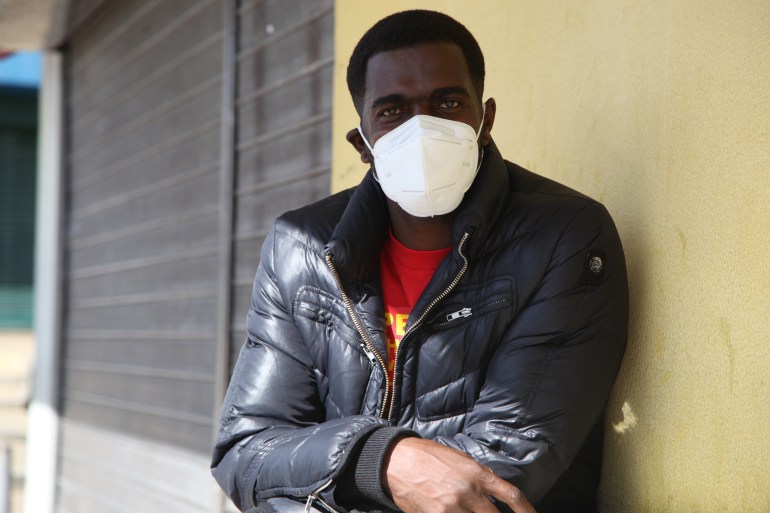Amid COVID-19, Portugal’s ethnic minorities feel heavily policed
Business owners in marginalised neighbourhoods say they are treated differently to white people, as pandemic highlights structural inequality.

For Sandra Pina, opening a kiosk snack-bar in Lisbon was a dream come true.
“When I came to Portugal, I worked selling food in the street, come rain or shine, before eventually becoming a market vendor … But to have my own business is more than I could ever have imagined,” she told Al Jazeera.
Keep reading
list of 3 itemsPortugal: Deadly racism, far-right growth draw global concern
Can Portugal confront its racist history?
Brightly painted, spotlessly clean, and selling homemade cakes and deep-fried Cape Verdean pastries alongside beers and coffees, Doces da Sandra (Sandra’s Sweets) serves customers in Casal da Boba, a neighbourhood in the suburbs of Lisbon.
Pina opened shop in August this year when Portugal’s COVID-19 infection rate was low, and food and drink outlets had reopened all over the country – especially those with outdoor spaces and take-away service like the kiosks.
“Lots of people were coming by and everything was going really well,” she says proudly “until the police started coming around”.
In September, police ordered Pina to close the kiosk for two weeks, leaving her without an income.
“They didn’t even give me time to clear up, so all the food I had stored went off by the time I could reopen. Since then, business hasn’t been the same – people don’t want to come because they see the police here all the time.”

According to Pina, the PSP police officers said they had been sent by the DGS (Portugal’s National Health Office, responsible for deciding COVID-19 public health measures) because she was selling beer, which is currently only permitted in Portugal after 8pm if accompanied by food.
Another reason often given for mandatory closures is that cafes allow people to gather in large groups. But here, as in many neighbourhoods in the suburbs of Lisbon, residents feel they are not being treated equally to people in the rest of the city.
“If you go down the road to the white neighbourhoods you’ll see the cafes are full of people drinking, sitting in groups, playing cards for example,” says José Sinho Baessa da Pina, a community organiser from Casal da Boba.
“They treat us completely differently up here. It’s like they’re not here to protect us – they’re here to provoke us.”
This sentiment echoes around the peripheries of Lisbon, in low-income areas and especially in those with significant Afro-descendent and Roma communities, where there have been numerous closures, and where relationships with the police are strained.
“We’ve had almost daily complaints from businesses in the suburbs saying, ‘We’ve been closed down, but the white cafe owner on the opposite corner has been allowed to stay open’,” says Mamdou Ba, one of the directors of the organisation SOS Racismo, which campaigns against racism and has been outspoken about police violence in Portugal.
“Racialised neighbourhoods here have always been policed differently,” says Ba. “But COVID has not only made this state of exception the norm, it has actually brought legal and institutional support for it.”
Images from a public health operation in May this year in the Bairro da Jamaica neighbourhood – where residents have been waiting for years to be rehoused from a precarious set of self-built towers – caused further anger.
More than 50 armed police officers in riot gear escorted a group of public health officials in quarantine suits in an operation to close eight local cafes during a COVID outbreak (the number of cases is disputed by residents, and since then the number reported in the press dropped from 49 to 19).
Several TV crews had been invited along to film the operation, and the coverage, which concentrated on rumours of a local party as the source of the outbreak, made the national news – provoking strong reactions.

Ana Rita Alves, an anthropologist who works on housing and racism in Portugal says: “The media has contributed to the criminalisation of racialised people in the peripheries, transmitting the idea that these are spaces that need to be cleansed and to be ‘civilised’ – as if they were a problem that needs to be fixed”.
Responding to suggestions that the policing is heavier in the suburbs, Alves replies: “In my own neighbourhood in central Lisbon, I don’t see the police going around here in riot vans, or wearing riot gear as they go around at night to check if people are out – but that’s what they do in the peripheries.”
Ba also voices concern that heavy policing is being normalised: “The very most vulnerable people in our society are being transformed into a threat. And the reaction from the public is just – well, that’s ok, because this is a state of emergency isn’t it? ”
The PSP police told Al Jazeera in a statement: “PSP operations are carried out in all major cities without prioritising the periphery in relation to the centre and without targeting certain types of establishments.
“Since the beginning of the pandemic, the PSP has been fully exercising its functions consistently throughout the country, as has been demonstrated by the countless operations that are accompanied by the media.”
But Cova da Moura residents say police turn up regularly, either dressed in riot gear or driving around the neighbourhood in riot vans.
“They’re using COVID as the perfect pretext,” says Flávio Almada, a community organiser and one of the claimants in Portugal’s most high-profile case of police brutality.
“People here have mostly taken it quite seriously, they are sensible and they protect each other,” says Almada. “But the reality is that they are not able to stop going to work or taking public transport; people here work to survive.”

De Pina paints a similar picture in Casal da Boba.
“Even though the impression in the media is that the peripheries are the epicentre of COVID, we’ve actually had hardly any cases here at all – but we are the most exposed.”
He catches the bus early in the morning to travel to the public hospital where he works as a security guard.
“The lower class, the Black class, didn’t stop working the whole way through the pandemic. Every day, the buses from here are packed, and the trains to Lisbon are full of cleaners, construction workers, supermarket workers and security guards like myself. We’re on the front line.”
Controlling the pandemic is significantly more challenging in areas with precarious housing conditions and overcrowding.
Overall, Portugal fared relatively well in the first wave, with a quick, strict lockdown and the early implementation of a testing system, followed by a relatively low mortality rate.
But the knock-on effects of the lockdown are expected to be dramatic on an economy that is historically weak and has become increasingly reliant on tourism in recent years, accounting for 15 percent of the economy and 17 percent of employment.
GDP is expected to retract by 8 percent this year – and unemployment set to soar.
With cases rising rapidly now, the outlook for those in the low-income neighbourhoods of the city, where job insecurity is compounded by factors like immigration status, is bleak.
“People here live hand to mouth,” says Almada, who, like de Pina, has been heavily involved in distributing food and other essentials locally during the pandemic.
“With all the recent closures in hospitality, we’re hearing from a lot of people in the community who have been laid off suddenly… the impact could be terrible.”
Back at her kiosk, Sandra Pina is worried.
“If I get shut down again I won’t be able to put food on the table or pay my rent … But this has been the story of my life – always struggling to find a way through.”